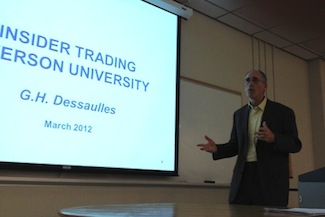Insider Trading and Market Integrity
 Cheng Yi Liang, a chemist for the US Food and Drug Administration, has been found guilty of Insider Trading and sentenced to 5 years in prison. (I first blogged about this case back in March, when Liang was arrested.)
Cheng Yi Liang, a chemist for the US Food and Drug Administration, has been found guilty of Insider Trading and sentenced to 5 years in prison. (I first blogged about this case back in March, when Liang was arrested.)
As it happens, the Liang verdict dovetailed nicely with the topic covered yesterday in the Management Ethics class I teach at the Ted Rogers School of Management. The class was led by a terrific guest speaker, compliance consultant and retired RBC compliance officer Georges Dessaulles.
The Liang case serves as a great example of one of the points Georges emphasized in his presentation, namely that when it comes to Insider Trading, highly-placed executives are far from the only concern. In the Freeport McMoran case in the mid-90’s, for example, the central figure was a consulting geologist, not an employee of the mining company itself. In the 2001 case related to Nortel’s acquisition of Clarify, the central figure was an executive working at a public relations firm that had a contract with Clarify. And now, in the Liang case, the guilty party not only didn’t work for the company in question, he didn’t have any contractual or other financial relationship with the company. Instead, he was a scientist at a regulatory agency. Other cases have involved administrative assistants, or even employees at companies printing corporate reports.
This highlights an important point about the ethics of insider trading. The stereotypical cases of insider trading involve executives, making use of undisclosed knowledge to gain an unfair advantage over outsiders in buying or selling stock. In taking unfair advantage, executives not only perpetrate a basic injustice, but also violate their duties to shareholders. But the kinds of cases cited above point to a different reason for the wrongness of insider trading. In the Freeport and Nortel cases, and now in the FDA case, the central figure wasn’t someone with direct obligations to corporate shareholders. There was thus no breach of fiduciary duty (at least not in the usual sense). What’s really at stake, in such cases, is the undermining of the basic principle of free-and-voluntary exchange on which the a free-market economy is based.
The challenge for organizations is to make sure that employees and contractors with access to sensitive information understand the definition of — and penalties for — insider trading. But that’s a serious challenge, especially at big companies. Better still would be for more people to understand the moral underpinnings of free markets quite generally, and to have the moral reasoning skills to figure out the rest from there.


Trading on the basis of undisclosed material information, or insider trading, is illegal. But imagine that insider trading were legal. Would insider trading be immoral, then?
I ask because a case can be made that insider trading makes markets more efficient by various means, like but not limited to pricing information into stock values.
As well, insider trading, like regular trading, isn’t a zero-sum game: a knowledgeable insider can trade with a less knowledgeable outsider, and both can benefit from the trade. Further, many of those outsiders would’ve still executed the trade if armed with the same knowledge as the ‘insidious’ insider.
I don’t often hear moral justifications for the prohibition against insider trading, outside of the vague “even playing field” argument from analogy, which tacitly assumes that, like some sports games, each trade necessarily has a winner and a loser. But trading isn’t a zero-sum game, unlike some sports games.
I’m sure there are moral justifications for the prohibition against insider trading. What do you think?
K.E.:
Good question. People have certainly proposed justifications for insider trading, based on the idea that the insider, in trading on privileged information, helps bring info to the market.
The problem, I think, has to do with the haphazard and self-interested manner in which insider trading performs that function.
Inside trades may well, as you point out, benefit outsiders too. But the fact that that can happen doesn’t mean that it’s likely to. I don’t know if the question of the extent to which that actually happens is susceptible to empirical investigation; I suspect the moral prohibition on insider trading would be rooted in the idea that, when in doubt, we prohibit behaviour that could tend to represent disloyalty.
See here for another blog entry where I cite a relevant scholarly article: